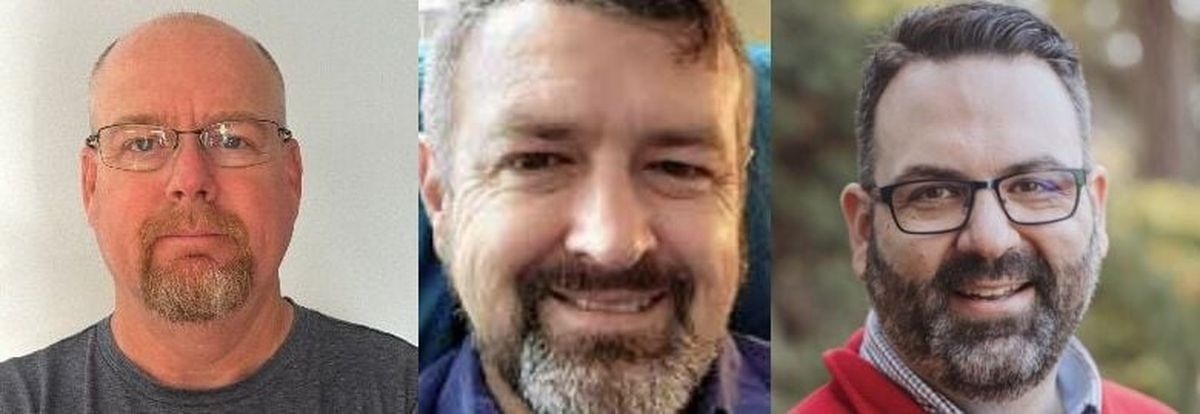Three newcomers face off in Cheney School Board primary without an incumbent

The Cheney school board election for district No. 4 features three political newcomers in a race without an incumbent.
Board member Stacy Nicol’s decision not to run again, after serving on the panel since 2015, leaves the seat vacant for one of three candidates: chauffeur for the elderly Bill Hanson, sustainable hydroponic home farmer Rick Flynn and former West Side school board member John Boerger.
Hanson, who said he has spent “countless” hours volunteering in his children’s classrooms as a teacher’s aid and coach, said the experience affords him a unique perspective on the issues in a classroom. While he last volunteered in 2019, he said a lack of resources for school staff and a disruptive learning environment for students were among his chief concerns in the classroom. If elected, he said he’d like to hear ideas from teachers to see what would lighten their load.
“I’d like to hear from teachers, what will help make you look forward to coming on the last day of school,” he said. “First day of school if you’re a teacher, you’re excited with all these new faces. But after 190, 200 days, you start to get a little burnt out.”
Harboring a longtime passion for civic engagement, Flynn sees the school board as a chance to dip his toes into politics.
Flynn said he’d like to provide more direction for students in their post-grad pathways other than college, which could include entering the workforce or going to a trade school. Establishing a “game plan” for students after high school is essential, especially for those not immediately bound for higher education, he said.
Having ended his 14-year-long stint on the Lake Stevens School District’s board in 2021, Boerger is eager to get back to “the best job (he’s) ever had,” if elected.
His work on the district’s long-range facility advisory committee gives him specific visions for Cheney’s future, Boerger said. Given a projected population boom in outlying areas within the district’s boundaries, he proposed two new elementary schools be built in Airway Heights and on the West Plains as part of a more extensive bond package that also includes maintenance on existing facilities and purchasing sites for new schools.
Learning loss recovery
When the COVID-19 pandemic necessitated school closures for over a year, learning from home proved to be a suboptimal alternative for many students. Standardized test scores have fallen across the board, exacerbated in poorer schools and among students of color, according to a recent state study.
Candidates differ on the best strategy to aid in learning loss recovery.
Hanson advocated for requirements such as study halls or afterschool programs to put the onus of learning on students. He cautioned lowering standards after COVID-19 school closures that he called an “extended summer vacation.”
“I believe somebody is only going to work as hard as the bar you set, and if you lower the bar, that’s all they’re going to go to,” Hanson said. “But if you set that bar high and encourage and support them, they will rise to the occasion.”
Flynn said more parental engagement is needed for students. Parents were unprepared when schools closed, leading to a lack of discipline in students to keep up their studies from home, he said.
Rather than a phenomena of learning loss, Boerger prefers to think of it as a “learning opportunity.” To best capitalize on this opportunity, Boerger suggested creating individualized learning plans for each student based on the resources they need to accelerate their learning. Those resources could include technology, in-class support or supplemental curriculum.
Sex education
Current sex education curriculum is required by the Office of the Superintendent of Public Instruction to meet statewide standards of age-appropriate, inclusive and comprehensive education based on science and medicine. The standards include lessons on human development, pregnancy, prevention of sexually transmitted infections, affirmative consent and healthy interpersonal relationships.
All candidates support the statewide sex education curriculum and underscored parents’ choices to opt their child out of receiving sex education in schools if they prefer to have that conversation at home.
Hanson said if a student asks a question that falls outside the scope of instruction per OSPI’s standards, it should be passed on to the parents of the child to be discussed privately.
Flynn said he’d be open to parental input via a survey or questionnaire on sex education curriculum, but since the standards are set by the state, he said there’s only so much the district can do.
Boerger said there are a lot of misconceptions surrounding sex education, and he would invite parents to sit in on classes to provide clarity.
“If people are genuinely concerned about it, come in and actually see what’s being taught and be an active participant in the process, because it’s a whole lot easier to sit outside and throw stones based on what you think is happening,” he said.
Law enforcement
Each candidate voiced support for an armed law enforcement presence in schools given the threat of school shootings.
Flynn said that person should be trained differently than a police officer.
“The training that police officers receive is a little overly aggressive for what needs to be applied to a school,” Flynn said. “That way they have more experience with child discipline, child psychology, being able to diffuse issues rather than confront them.”
Hanson suggested a law enforcement professional on campuses could perform drug sweeps and curb vaping among students in schools, as well as break up fights.
Boerger added that the district should strengthen its relationship with local law enforcement, suggesting that police engage in active shooter drills in schools during summer vacation.